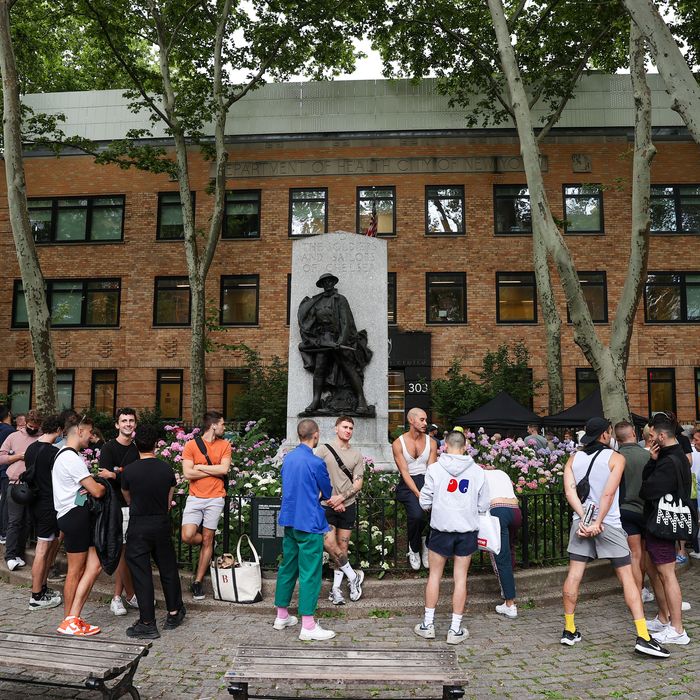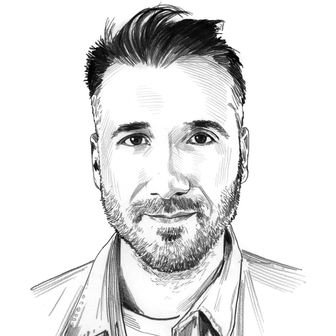
As the city’s LGBTQ+ community prepares to revel in Pride festivities this coming weekend, the mood outside of the sexual-health clinic in Chelsea on Thursday, where hundreds of men lined up to be vaccinated against monkeypox, was decidedly not festive.
“The city and the federal government are not doing a great job to protect the gay community during this outbreak,” said James Krellenstein, an activist who managed to get an appointment and received his first shot on Thursday. “This is a recipe for disaster that will lead to a mass-transmission event.”
On the eve of the first Pride parade to have a full slate of programming since the pandemic began, many in the gay community are feeling anxious about monkeypox, the smallpox-like disease that’s been detected in 3,500 people around the globe. While the number of confirmed cases in the New York remains low, with 30 New Yorkers testing positive since the outbreak began, more than half of those cases have occurred in the past week, and almost all of them were in men who have sex with men, according to the Department of Health and Mental Hygiene. Monkeypox is not a sexually transmitted disease, but it’s spread during skin-to-skin and prolonged respiratory contact during sex. Cases in Germany were linked to parties “where sexual activity took place,” and Spain has traced outbreaks to a sauna in Madrid as well as a Pride event in the Canary Islands.
“This is all because of Pride,” said Evan Ipock, gesturing at the people in line who, like him, were waiting for hours in the hopes of snagging a walk-in appointment. “People want to be able to feel safe having fun this weekend.”
But a mere 275 shots were administered on Thursday, according to the Department of Health, and the federal government has allocated the city just 1,000 doses of the Jynneos vaccine, a smallpox vaccine that has proven to be 85 percent effective against monkeypox. The vaccine requires two doses spread four weeks apart to be fully effective, though a single dose has proven to stimulate a robust antibody response in clinical trials, according to the Centers for Disease Control. Even if the city were to exhaust its entire allotment before the weekend, it wouldn’t even cover the 5,000 people expected to attend a single Pride party in Brooklyn on Sunday.
“There’s definitely people who are thinking twice about going to the more sex-based parties, restricting their behavior. There’s a lot of anxiety in the community,” said Aaron Lord, a Brooklyn neurologist who was waiting for a shot. Lord said he had friends and family who traveled to Canada, which started vaccinations weeks ago, to get a shot.
Some of that anxiety comes from the lack of information about the disease, the symptoms, how it’s spread, and who is at risk.
“As soon as I heard there was a vaccine, I booked it,” said Royi Gavrielov, who got a shot after three hours. “That being said, I didn’t know there were two versions of the vaccine, or that the older version carried quite a bit of risk. I didn’t know that it was a two-dose thing. I’d like to know, when exactly is it transmissible? What should be expected between when you feel symptoms of illness versus the actual pox appearing? How can I know that, if I have a pimple breakout, it’s a whitehead and not a pox? I want that information to be more available to those of us who are seeking it out.”
According to the CDC, monkeypox symptoms usually start within two weeks of exposure. Symptoms range from exhaustion to fever, headache, and muscle aches. One to three days after symptoms present, most people will develop a rash or sores around the genitals, anus, hands, feet, chest, or face. The disease is transmissible from the earliest onset of symptoms until the sores or scabs have fully healed, which can take several weeks.
Recalling the earliest days of COVID, the CDC issued guidance for lowering risk at parties, raves, and sex clubs. The guidelines recommend people who show symptoms have virtual sex or engage in mutual masturbation at a distance of at least six feet. “Consider having sex with your clothes on,” reads one bullet point.
Pride was one of the reasons Chris Adams, a nurse from Stamford, Connecticut, drove to Chelsea upon hearing from a co-worker that the vaccine was available. Still dressed in scrubs from work, Adams joined the back of the queue toward the end of the day, unsure if he’d make it to the front before supplies ran out. “It’s unfortunate that it took so long for them to start vaccinating,” Adams said, “but waiting is worth it for me to feel safe.”






























